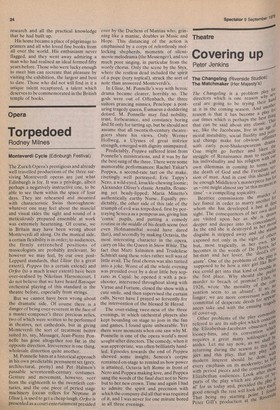Opera
Torpedoed
Rodney Milnes
Monteverdi Cycle (Edinburgh Festival) The Zurich Opera's prestigious and already well travelled productions of the three surviving Monteverdi operas are just what Edinburgh is for. It was a privilege, albeit perhaps a negatively instructive one, to be able to see them within the space of four days. They are rehearsed and mounted with characteristic Swiss thoroughness: whatever one may feel about the muscial and visual sides the sight and sound of a meticulously prepared ensemble at work was extremely heartening. Of course, we in Britain may have been wrong about Monteverdi all along. On the musical side, a certain flexibility is in order; to audiences, the firmly entrenched positions of musicologists are probably irrelevant. So however we may feel, by our own postLeopard standards, that Ulisse (to a great extent), Poppea (to a certain extend) and Orfeo (to a much lesser extent) have been over-realised by Nikolaus Harnoncourt, I do not believe that we have heard Baroque orchestral playing of this standard in the theatre before, especially from strings.
But we cannot have been wrong about the dramatic side. Of course there is a danger of being over-reverent in the face of a master-composer's three precious relics, two of which were written to be performed in theatres, not cathedrals, but in giving Monteverdi the sort of treatment better suited to, say, Messager, Jean-Pierre Ponnelle has gone altogether too far in the opposite direction. Irreverence is one thing, wholesale distortion quite another.
M. Ponnelle hints at a historical approach in his own predictable permanent set (grey, architectural, pretty) and Pet Halmen's passable seventeenth-century costumes. Gesture and movement, however, veer from the eighteenth to the twentieth centuries, and the one piece of period stage machinery (ocean rollers for Neptune in Ulisse), is used to get a cheap laugh. 0 rfeo is presented as a court entertainment presided over by the Duchess of Mantua who, grinning like a maniac, doubles as Music and Hope. This distancing of the action is emphasised by a corps of relentlessly mollocking shepherds, moments of silentmovie melodrama (the Messenger), and too much poor singing, in particular from the woofy chorus. Only the scene by the Styx, where the restless dead included the spirit of a pope (very topical), struck the sort of note than answered Monteverdi's.
In Ulisse, M. Ponnelle's way with heroic drama became clearer, horribly so. The gods were out of Offenbach, the three suitors prancing ninnies, Penelope a posturing tragedy queen, Eumaeus a doddering dotard. M. Ponnelle may find nobility, trust, forbearance, and constancy boring and fit only for tarting up, but he should not assume that all twentieth-century theatregoers share his views. Only Werner Hollvveg, a Ulysses of great interior strength, emerged with dignity unimpaired.
Predictably, Poppea suffered least from Ponnelle's ministrations, and it was by far the best sung of the three. There were some memorable performances: Rachel Yakar's Poppea, a second-rate tart on the make, rivetingly well portrayed; Eric Tappy's Nero, a wild-eyed, knuckle-chewing loonie; Alexander Oliver's classic Arnalta, flouncing yet beady-lipped; Maria Minetto's authentically earthy Nurse. Equally predictably, the other side of this tale of the triumph of evil was torpedoed, first by portraying Seneca as a pompous ass, giving him 'comic' pupils, and putting a comedy routine in the middle of his death scene (not even Hofmannsthal would have dared that), and secondly by making Octavia, the most interesting character in the opera, carry on like the Queen in Snow White. The fact that Matti Salminen and Trudeliese Schmidt sang these roles rather well was of little avail. The final chorus was also turned into a joke. Worst of all the whole evening was presided over by a dear little boy soprano as Cupid: he opened it with a peashooter, intervened throughout along with Virtue and Fortune, closed the show with a cute smile, and then supervised the curtain calls. Never have I prayed so fervently for the intervention of the blessed St Herod.
The over-riding twee-ness of the three evenings, in which orchestral players also kept bounding on stage to join in the fun and games, I found quite unbearable. Yet there were moments when one saw why M. Ponnelle is one of the opera world's most sought-after directors. The comedy, when it was appropriate, was often brilliantly handled. Episodes towards the end of Poppea showed some insight; Seneca's corpse remained on-stage to remind us how power is attained, Octavia left Rome in front of Nero and Poppea making love, and Poppea sang the words of the final duet not to Nero but to her new crown. Time and again I had to admire the spirit and precision with which the company did all that was required of it, and I was never for one minute bored in all three evenings.


































 Previous page
Previous page